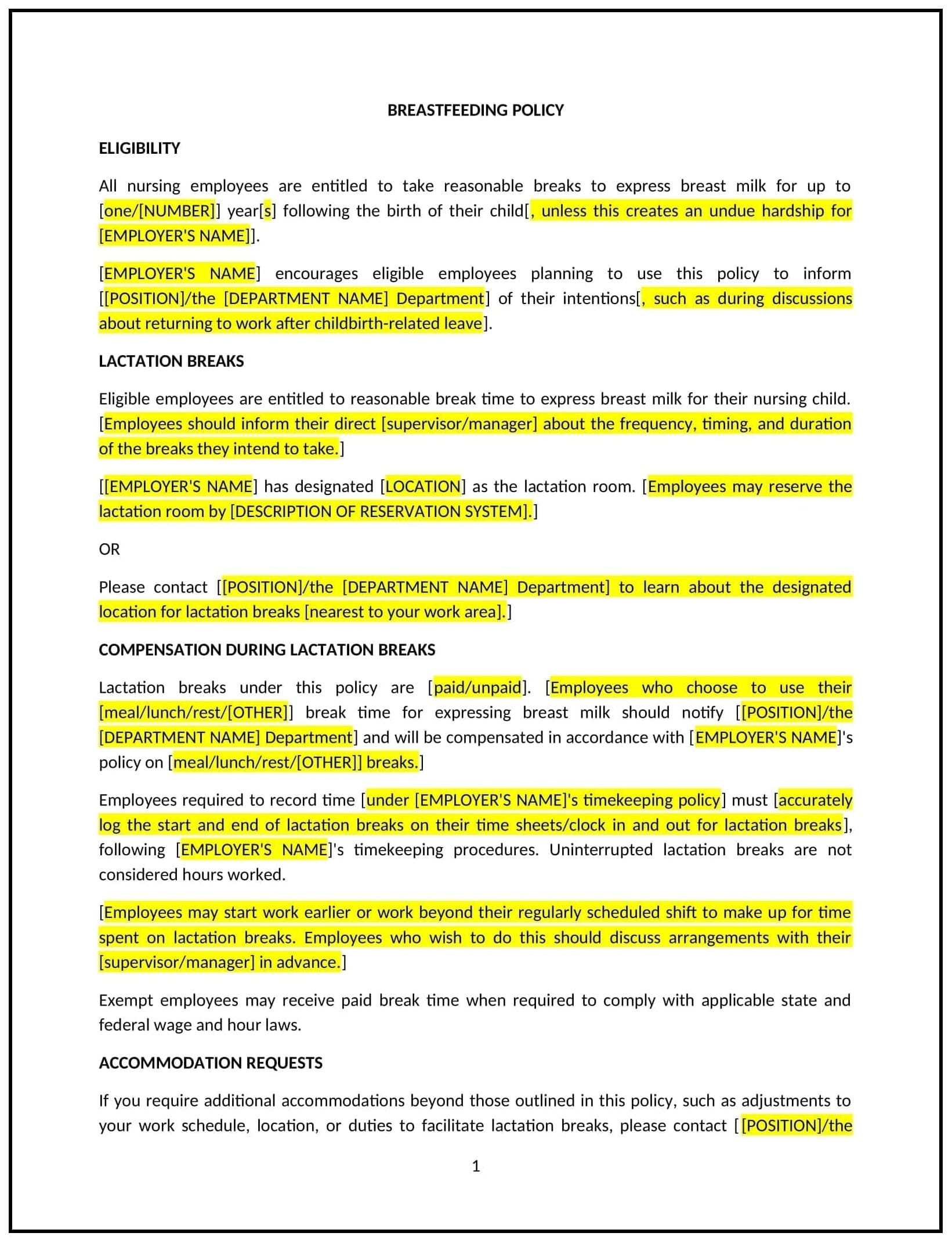Breastfeeding break policy (New York): Free template
Got contracts to review? While you're here for policies, let Cobrief make contract review effortless—start your free review now.

Customize this template for free
Breastfeeding break policy (New York)
A breastfeeding break policy helps New York businesses support employees who are breastfeeding by providing the necessary breaks and facilities to express breast milk during work hours. This policy outlines the requirements for reasonable break times, private spaces for breastfeeding or pumping, and any accommodations necessary to bolster employees' rights in alignment with New York and federal laws, including the Fair Labor Standards Act (FLSA) and the New York State Human Rights Law.
The policy aims to create a supportive and inclusive workplace for breastfeeding employees while maintaining productivity and legal compliance.
By implementing this policy, businesses can promote a healthier work environment, enhance employee retention, and demonstrate a commitment to supporting working parents.
How to use this breastfeeding break policy (New York)
- Define break times and duration: Specify the amount of break time employees are entitled to for breastfeeding or pumping, in compliance with New York state and federal laws. The policy should ensure that employees have adequate time to express breast milk, which may vary based on the employee’s needs and the nature of the job.
- Provide private and appropriate spaces: Outline the availability of clean, private, and secure spaces where breastfeeding employees can express milk without interruption. The policy should ensure that the space is not a bathroom and is equipped with necessary accommodations such as seating, electrical outlets, and a hygienic environment.
- Address flexible scheduling: Allow for flexibility in scheduling breastfeeding breaks, recognizing that employees may need to pump at different times during the day. The policy should ensure that break times are reasonable and that employees can coordinate with their supervisors to accommodate pumping needs without disrupting workflow.
- Ensure non-punitive treatment: Specify that employees will not face discrimination, retaliation, or any adverse action for taking breastfeeding breaks. The policy should clearly state that the company supports employees in their breastfeeding choices and that these breaks will not impact their employment status, job performance evaluations, or advancement opportunities.
- Include guidance on job accommodations: Outline how businesses will accommodate breastfeeding employees who may need adjustments to their job duties, work schedules, or breaks to manage breastfeeding or pumping, while ensuring that business operations are not unduly affected.
- Comply with New York state and federal laws: Ensure the policy complies with New York State’s breastfeeding laws, which provide employees with the right to express breast milk at work, as well as with the federal FLSA, which mandates reasonable break time for nursing mothers.
Benefits of using this breastfeeding break policy (New York)
This policy offers several benefits for New York businesses:
- Supports employee well-being: By providing the necessary breaks and accommodations for breastfeeding employees, businesses foster a healthier and more supportive work environment. This policy helps employees balance work and family responsibilities, contributing to overall well-being.
- Enhances employee retention: Supporting breastfeeding employees through reasonable accommodations can improve job satisfaction and increase retention rates, particularly among working parents who appreciate a company that values work-life balance.
- Promotes inclusivity and equality: The policy helps ensure that breastfeeding employees are treated with dignity and respect, promoting a culture of inclusivity and equal opportunity for all employees, regardless of their parental status.
- Complies with legal requirements: By implementing this policy, businesses ensure compliance with New York state and federal laws, reducing the risk of legal liabilities or complaints related to breastfeeding rights in the workplace.
- Improves company reputation: Companies that demonstrate a commitment to supporting employees’ health and family responsibilities are viewed positively by current and potential employees, as well as the public. This can enhance a business's reputation as an employer of choice.
- Increases productivity: When employees feel supported in their breastfeeding needs, they are more likely to remain focused, engaged, and productive. Providing the necessary breaks allows breastfeeding employees to manage their responsibilities without compromising work performance.
Tips for using this breastfeeding break policy (New York)
- Communicate the policy clearly: Ensure that all employees, particularly those who are pregnant or may be breastfeeding, are aware of the breastfeeding break policy. This can be communicated through employee handbooks, orientation sessions, or HR discussions.
- Offer flexibility: Provide flexibility in the scheduling of breastfeeding breaks, allowing employees to coordinate with supervisors to find times that work best within the workflow of the day. This ensures that both the employee’s needs and the business’s operations are balanced.
- Provide appropriate facilities: Ensure that designated spaces for breastfeeding or pumping are private, comfortable, and equipped with the necessary resources. Regularly check these spaces for cleanliness and functionality to ensure they meet employee needs.
- Be supportive and non-discriminatory: Reinforce a supportive and non-discriminatory approach to breastfeeding employees by ensuring that no employee is penalized for taking the necessary time to express milk. This creates a positive environment where employees feel valued.
- Monitor the effectiveness of the policy: Regularly assess how the policy is working and whether employees feel they are receiving the accommodations they need. Gather feedback to identify any areas for improvement or adjustment in the policy.
- Review and update the policy regularly: Ensure that the policy remains compliant with changes in New York state laws, federal regulations, or best practices regarding workplace accommodations for breastfeeding employees. Regularly update the policy as needed to maintain compliance and effectiveness.